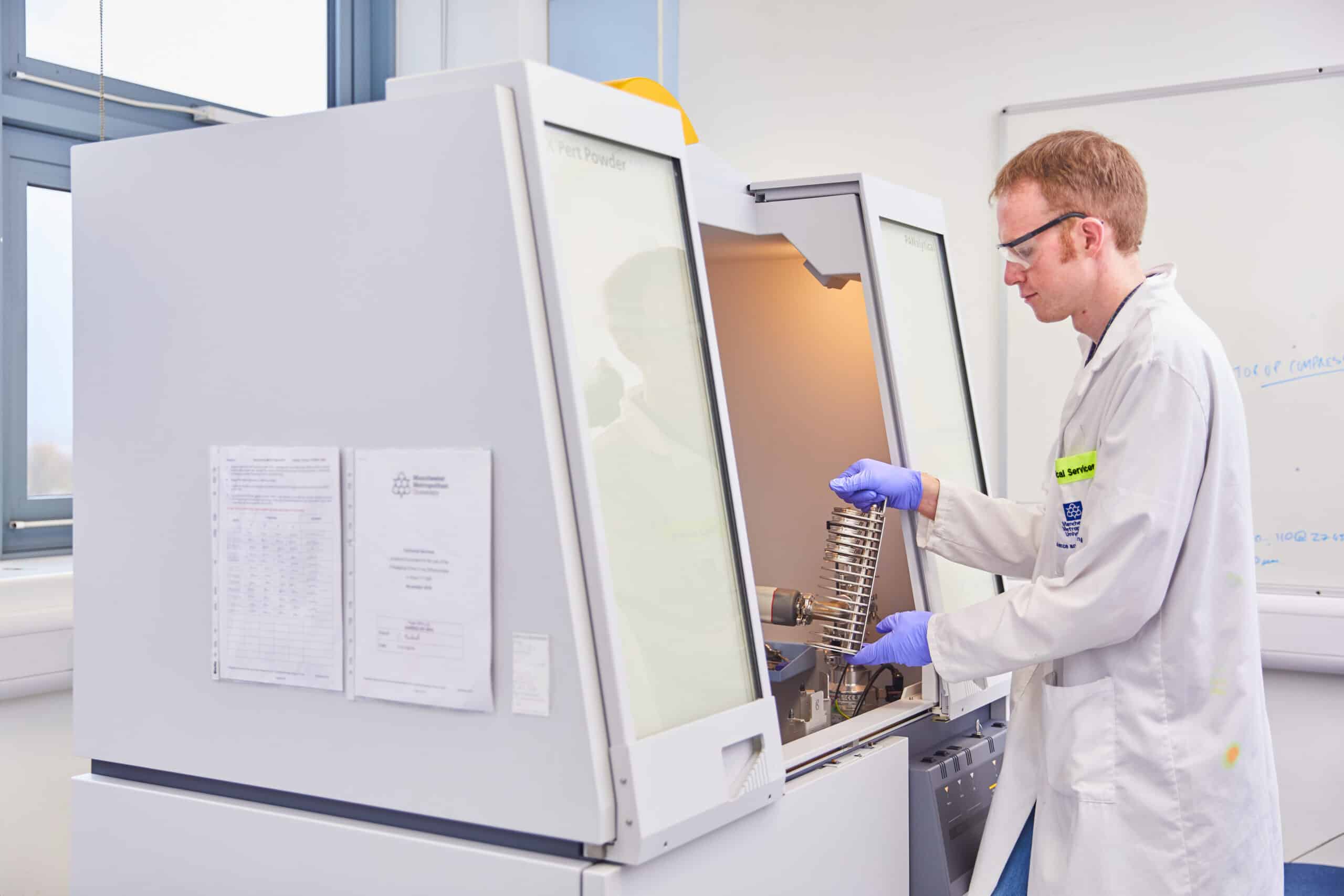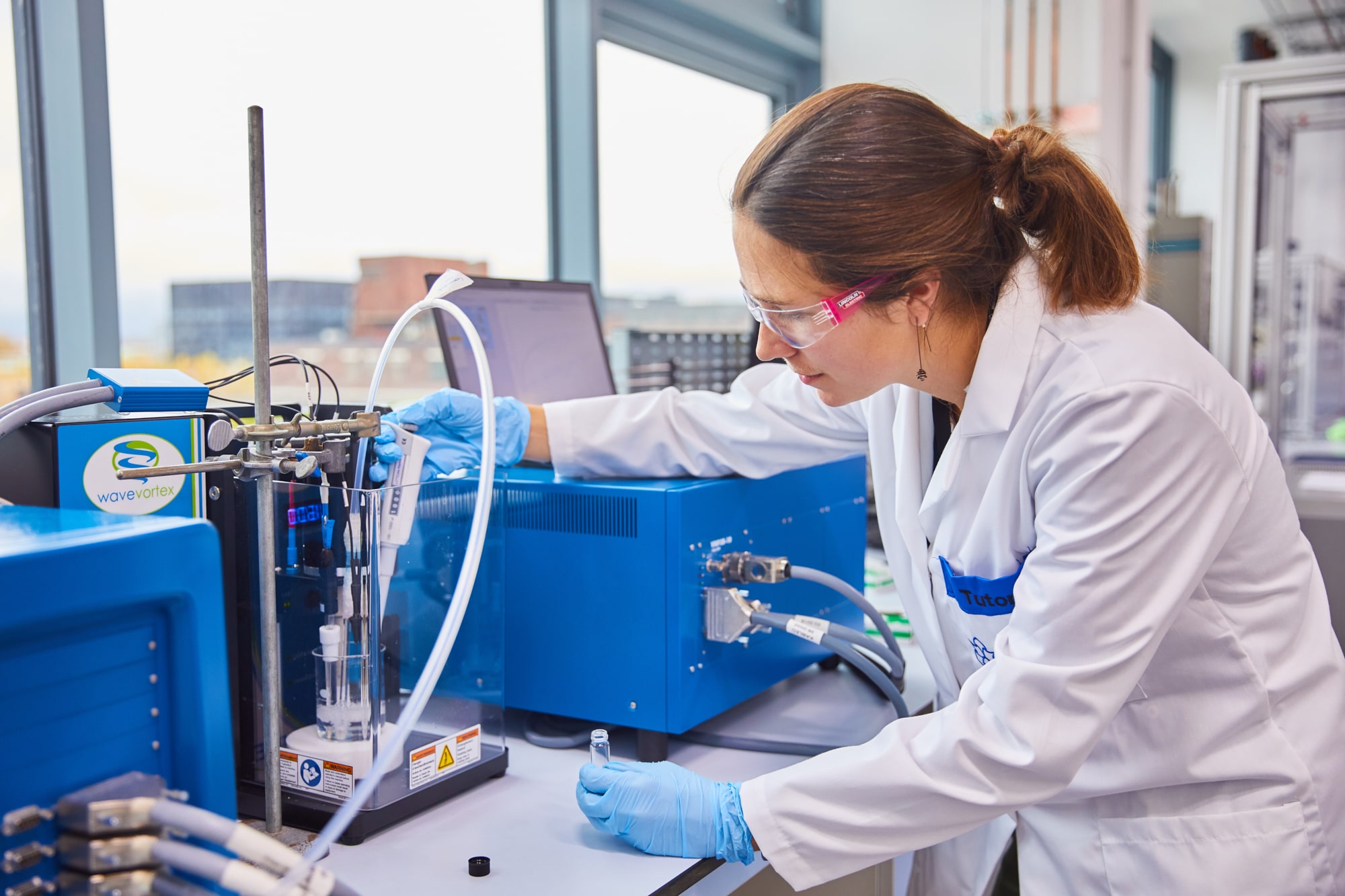Eleanor Stanley was excited to start her postgraduate education at Manchester Metropolitan University. She had completed a BSc Chemistry here previously — three years filled with fun and support from “friendly, welcoming, and incredibly supportive lecturers that are eager for everyone to succeed.”
Stanley’s now pursuing the MSc Advanced Materials — and with bigger goals in mind. “I chose this programme as I am passionate about using science and innovation to tackle real-world problems,” she says. “Not only does this course cover fundamental research areas, but also provides the opportunity to gain hands-on experience and be taught by leading experts in their fields.”
The programme builds a strong understanding of materials chemistry, including the design, analysis, and characterisation of materials. Students explore chemistry and project management – a unique combination that will help develop professional skills and prepare them to join the industry.
“The MSc Advanced Materials is a course that looks at a diverse range of topics, all under the heading of materials. That could include anything from nanomaterials and understanding morphology composition to analysing energy materials and how we’ll produce energy in the future”, share Dr. Laurie King, a tutor on the programme.
That’s not all. Imagine learning in collaboration with the Fuel Cell Innovation Centre to tackle the global challenges that arise from climate changes. Two of the course’s flagship modules – Energy Materials and Innovative Materials – were developed by staff at the Fuel Cell Innovation Centre. Here, students explore next-generation energy storage and conversion technologies which seek to harness renewable energy.
Upon graduation, students like Stanley are set to become material scientists working in areas like health, energy, mobility, communication, environment and climate management.
Manchester Metropolitan University is already opening many doors for them. “The department provides strong, direct links with relevant leading companies in industry,” says Stanley. “Additionally, lecturers are eager to enable students to gain relevant research experience in areas they are interested in.”
With these features, she’s confident she has a bright future ahead — with many in-demand skills in hand. “I believe this course will provide me with essential technical and analytical skills that will be required for any job I would want to pursue,” says Stanley.
Outstanding facilities: A breeding ground for innovative students
Scientific studies, especially those that deal with the development of advanced materials, will only be possible with the right equipment. Manchester Metropolitan University knows this, so they have all you need to learn the latest analytical and materials characterisation techniques such as X-ray diffraction, scanning electron microscopy, X-rays photoelectron spectroscopy and many more.
The university is preparing for future material scientists too. Its science and engineering campus is being redeveloped to include highly flexible learning and communal spaces with world-class facilities, allowing students, staff,industry leaders and the local community to easily interact with each other, ensuring that knowledge and scientific breakthroughs are transferred to the real world.
Over at Fuel Cell Innovation Centre, the landmark 4.1 million pounds state-of-the-art laboratories, researchers are leading the way in harnessing renewable energy. The Centre is exploring the pure science of the fuel cell itself, driving engagement with industry on a local, national and international scale, and developing the technology talent of tomorrow. At Print City, a 3D additive and digital manufacturing centre, students have access to a large and varied range of 3D printers for manufacturing plastic and metal parts, coupled with facilities for investment casting of small metal parts such as jewellery.

Manchester is a bold, modern city, full of culture and creativity, discovery and enterprise – the perfect setting for students pursuing the MSc Advanced Materials. Source: Manchester Metropolitan University
Learn alongside world-leading researchers
The MSc Advanced Materials is delivered by a team of enthusiastic teachers and researchers. Picture learning from a multidisciplinary group of researchers from the Advanced Materials and Surface Engineering Research Centre who are experts in advanced functional materials and catalysis, nanotechnology, electrochemistry, and surface engineering. That’s what a Manchester Metropolitan University is all about.
The MSc Advanced Materials combines this practical, research-led understanding with industry-standard project management techniques – the ideal combination to help you advance your career.
Stanley agrees. “Undertaking an extended research project requires you to use your initiative and be accountable for your own work, as well as enhancing time management skills and the ability to adapt when tasks may not go as planned,” she says. “Finally, building good working relationships with peers as well as project supervisors is vital in developing strong teamwork and interpersonal skills.”

Projects at the Department of Natural Sciences are diverse and multidisciplinary. Source: Manchester Metropolitan University
The projects Stanley speaks of are diverse and multidisciplinary. They contribute to developing nanostructured catalysts for electrochemical water splitting, electrocatalysts for ammonia production, or materials for energy storage applications.
Little wonder why MSc Advanced Materials graduates can find themselves in technical roles driving discovery or managerial roles leading teams. They can choose to work as a research scientist, quality control chemist, technical manager or further their studies with a PhD as well.
An optional industry placement can also help to strengthen your skill set and put your theory to the test in a practical work environment. This is the perfect opportunity to gain transferable workplace skills, boost your CV, and gain valuable insights before you graduate.
Finding a placement is made easier with the Careers Service. Additionally, expect to receive loads of help and advice from staff at the Department of Natural Sciences. For those who have found a placement, tutors will ensure that it will align with your career aspirations so that you get the most from your time in the industry.
If you seek a sustainable future driven by clean energy, click here to discover how you can make that a reality at Manchester Metropolitan University today. Remember to apply for your Academic Technology Approval Scheme (ATAS) certificate before starting this programme.
Follow Manchester Metropolitan University on Facebook, Twitter, YouTube, and Instagram.











